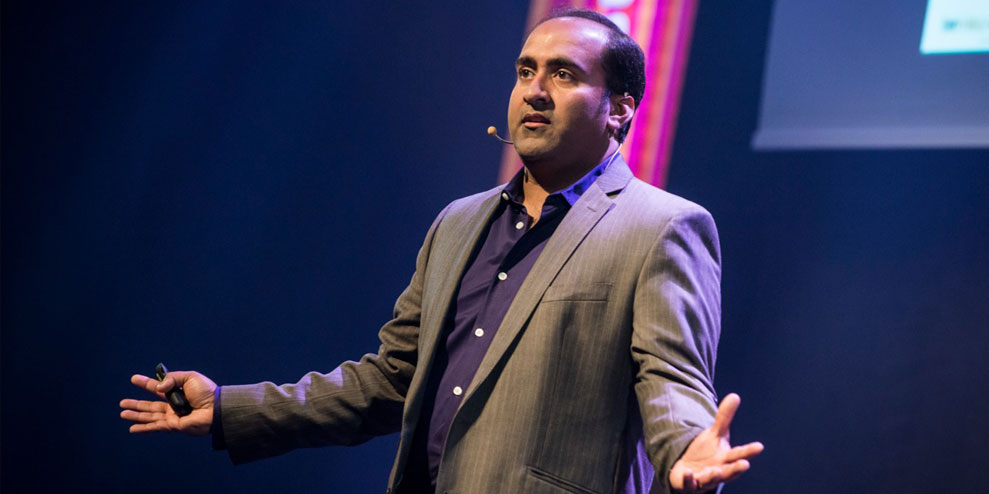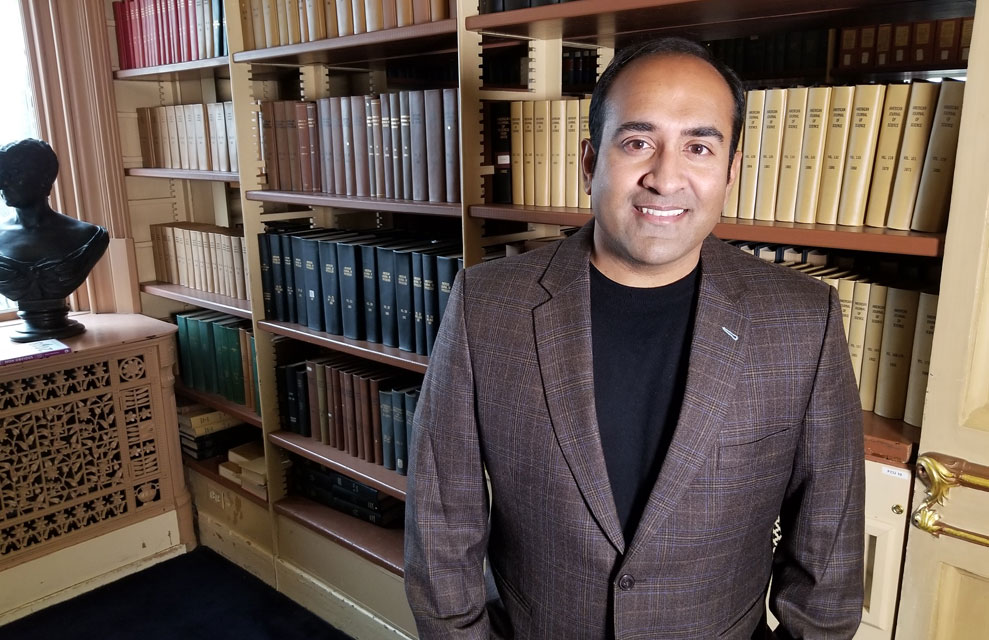Rohit Bhargava brings in an unusual, hitherto unexplored, tangential dimension to business and marketing thinking and is considered one of the foremost in disruption and innovation of the present era. He is the founder of the Non-Obvious Company and a new age serial entrepreneur. Over the past almost a decade, he has been curating and scripting about trends that will change the game in his seminal work Non Obvious(the book series, a Wall Street Journal best seller). BrandKnew, published by ISD Global had a chance to catch up with Rohit in this inspiring conversation.
BK: Could you share a bit about your growing up days, your family etc?
RB: Sure, I spent most of my childhood in Washington DC growing up, but I traveled very often as a child due to my father’s job at the World Bank. I think I took my first trip to Africa when I was less than one! So I was lucky because I had the chance to see a lot of the world and experience more than just one place.
BK: What triggered your interest in writing and your experience and leanings especially towards the ‘non obvious’? In Psychology it’s said that ‘ the brain remembers what it least expects. So, deliver the unexpected !- is that where you are coming from?
RB: I think I’m drawn to unusual ideas partially because I have always worked in a creative industry, but also because I think the world needs more of them and so I do my best to share them with my readers and audience to help spotlight those stories and people and companies that we might otherwise have missed.
BK: Does a bad engineering student make a good author?
RB: Well, I would have made a bad engineering student – but I don’t believe they are exclusive. In fact, one of my favorite books is written by a Physicist named Alan Lightman and it’s a poetically written book called Einstein’s Dreams. It is brilliantly written. Some people have the ability to cross those barriers and I think we should celebrate them.
BK: 6 is the new 30. Shorter attention spans, vertical orientation, platforms like IGTV, the potential of UGC(User Generated Content): are we moving from the overt to the covert, appealing to the sub conscious rather than the conscious? What is your take and what are the learning and lessons for brand marketers and content creators in all these?
RB: I am not sure that the desire to communicate in this way is all that new. What is different is just how sophisticated technology has become in enabling us to do this. So before we may not have been able to appeal to various attention spans as effectively or optimize our efforts by using quite so much quantitative data to measure results, but now we can.
BK: Your first couple of books aka ‘ Personality Not Included ‘ and ‘ Likeonomics ‘- could you share the inspiration behind the books and I must add their very creative titles?
RB: Creative titling was part of what I think I learned by working in advertising! Personality Not Included was all about why brands need to have a personality and be more authentic. And Likeonomics was about why we choose to do business with people we like and how to be more likeable.
BK: How much of your stint in advertising with Leo Burnett & Ogilvy help you in your writing?
RB: I think my past in advertising has helped me find a more human and down to earth voice for my writing. When you are writing persuasively for advertising, you need to be sure you are not using words that are confusing or expecting people to read too much. As a result, you learn how to be logical, engaging and to write less words.
BK: Many congratulations on an incredible Non Obvious journey: Curation, distilling, aggregation, trend spotting- bringing out the Non Obvious series of books, ten years on the trot would have taken a lot of doing- could you take us through the drill?
RB: It has indeed been a lot of work over the past ten years – but I am thankful that doing this trend report every year, and more importantly writing my weekly email with curated non-obvious stories has created a habit for me where I am constantly seeking and saving interesting stories and ideas. The result of this habit is that I always have sources and information coming in my door.
BK: A decade on, the curtain has come down on the Non Obvious series: any particular reason?
RB: The biggest reason I decided to make this edition the final one is because I have a much larger vision for the Non-Obvious brand. We have a popular book awards program already. I will be launching a podcast later this year. And the biggest news is that we have launched the Non-Obvious Guide Series (www.nonobvious.com/guides) which is letting us take the brand and reach far more people and help it bring more people together instead of just referring to my one book.
BK: Why do you make the case for Eating Left Handed?
RB: I realize that eating left handed is not good advice in many parts of the world. I wrote about it partially because of this. But mostly it was because if I was eating with my left hand at the many networking events that I went to, then I would be prepared to shake hands with my right hand and be more approachable.
BK: Trust seems to be a core area of your research, writing, speaking etc: AI, Machine Learning, Predictive Analytics, Data Science etc: where do you see the human mind in the midst of all this? And do all of these increase or decrease trust?
RB: It is true that Trust is a major theme in much of my work. I don’t think the technology alone will increase OR decrease trust. Instead, I think that the technology is moving so quickly that the thing we have to uncover is how we can regain trust in one another and the institutions around us which we often don’t trust either.
BK: In a world of high infidelity by consumers, price loyalty by brands and tactics that organisations lean on to realise the next quarter earnings, do you see something like trust, meaning, pupose getting an ear and having a stronger role to play?
RB: Even in a world fascinated by short term results, there are many large organizations working harder to build purpose into their experience and I find a lot of hope in that. Not only is it valuable to better connect and keep customers, but using purpose is also a secret weapon to drive employee engagement.
BK: In our practice at ISD Global with brands and organisations, we have been proposing the value and impact of ‘UFP (Unique Feelings Proposition)’ and then by design move away from USP (Unique Selling Proposition) in an increasingly commoditised world. Do you see a new culture emerging based on the aforementioned?
RB: Yes, though I think that there perhaps has always been one. When you consider how we make decisions based on emotions and the way the human brain works, I think this argument is very true.
BK: Considering that educational institutions shape mindsets, do you think there is too much focus on STEM Subjects (Science, Technology, Engineering, Math) at the cost of history, culture, anthropology, arts, social sciences etc that is making the gap wider between what people want and what brands deliver ?
RB: I do think perhaps there is too much focus in education on these core topics and the best evidence of this is how undervalued great communication has become in some industries. We do need more education around communication and more ways to ensure that all of us have the most basic skills required to bring our ideas to the right people and to have enough communications ability to make sure that our best ideas survive.
BK: What do you enjoy doing more- writing, speaking or consulting?
RB: To be honest, it is the balance that makes me happy. I don’t think I could spend all of my time doing any one of them because I would get tired and bored. Being able to have time on the big stage in front of people teaches me something about myself and how to engage others. I learn similar things from the more solitary work of writing or consulting.
BK: Not putting you in a spot here- but do you want to share with us your most exciting, meaning fulfilled project till date- and why?
RB: Since I am at the ten year anniversary of my annual trend work and I just released the tenth and final edition of that – I would say that the Non-Obvious trend report project has been most on my mind and would be the easy answer to this question.
BK: Could you tell us about the books and people who have inspired your life and career?
RB: There are too many books to count here. I am very inspired by books and read a wide variety of them. The good news is, I frequently talk about them and share them in my own books and writing. I even lead a team to evaluate the best business and nonfiction books every year as part of our Non-Obvious Book Awards (www.nonobvious.com/bookawards).
BK: What makes Rohit Bhargava go ‘Wow, another day at work’?
RB: I am lucky that I am invited to speak at events around the world and many of them happen at very nice locations or venues. Any time I have the opportunity to do that and visit one of those places, I think to myself how lucky I am.
BK: What do you do in your spare time? Your leisure time pursuits (other than going to the Olympics😀😀)?
RB: As a father of two boys, I spend a lot of time on sports fields – mainly for both types of football (American and global). My boys play both and I coach both, so I have a lot of joy in playing those sports and spending time with my kids doing both.
–
Seeking to build and grow your brand using the force of consumer insight, strategic foresight, creative disruption and technology prowess? Talk to us at +971 50 6254340 or mail: engage@groupisd.com or visit www.groupisd.com/story



